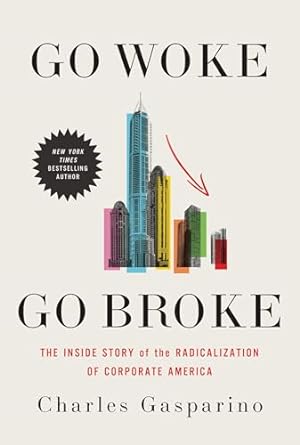The Conundrum of Woke Capitalism
Why did corporate America become more interested in making leftist political statements than earning profits for shareholders? And how can it be fixed? Commerce is, after all, a two-way street.
This essay first appeared in Law & Liberty on December 4, 2024 (here). Thanks to Power Line, Real Clear Policy (here), and Buck Throckmorton at Ace of Spades HQ (here)!
Commerce is supposed to be apolitical. Free-market exchanges promote economic efficiency and consumer welfare because consensual transactions between buyers and sellers are indifferent to anything but the price—Adam Smith’s “invisible hand.” Money is fungible and business is impersonal. All that matters is voluntary cooperation by uncoerced actors. As Nobel laureate Milton Friedman explained in Free to Choose, “the price system enables people to cooperate peacefully in one phase of their life while each one goes about his own business in respect of everything else.” This is the opposite of politics. Absent fraud or collusion, the same economic principles govern businesses. Thus, Friedman famously argued that corporations exist to maximize profits for the shareholders, not to promote “social justice” (however conceived).

With these intellectual underpinnings, how did free-market capitalism become woke? Corporate America is now wracked by ESG (Environmental, Social, and Governance), DEI (Diversity, Equity, and Inclusion), BDS (Boycott, Divestment, Sanctions), and other forms of leftist politics. Publicly-traded companies boast about “sustainability,” being LGBTQ+ friendly, favoring Black Lives Matter, and promoting the interests of global “stakeholders”—not shareholders. Veteran Fox Business journalist Charles Gasparino entertainingly tackles this conundrum in Go Woke, Go Broke. The subtitle of his book is The Inside Story of the Radicalization of Corporate America. This is a big topic, explored at length by Vivek Ramaswami (in Woke, Inc.), Carl Rhodes (in Woke Capitalism), Stephen R. Soukup (in The Dictatorship of Woke Capital), in a Law & Liberty symposium on Woke Capital, and elsewhere. Well-trod terrain, in other words. What fresh insights does Gasparino contribute in his new book?

The New York-based Gasparino is first and foremost a reporter, not a theorist, so his book consists of vignettes gathered from covering his beat on Wall Street, often based on tips provided by insiders. Investment banks used to be the domain of aspiring “Masters of the Universe,” in the parlance of Tom Wolfe from his classic novel The Bonfire of the Vanities. The culture of Wall Street has changed from Wolfe’s Reagan-era depiction and the “greed is good” ethos exemplified by the character Gordon Gekko in the movie Wall Street, both circa 1987. At the powerful investment bank Goldman Sachs, ruthless traders pulling all-nighters now debate whether it is “safe” to order Chick-fil-A, or whether doing so would be considered “bigoted” by Goldman’s human resources department. Since when did swaggering investment bankers kowtow to the woke scolds in HR?
Alas, we are no longer in the 1980s, and corporate America no longer plays by Milton Friedman’s rules. Goldman Sachs’s HR department now publishes a guide on gender pronouns, and to appease leftist critics Chick-fil-A has hired a diversity officer. During the summer of 2020, in the wake of racial unrest in Atlanta (where Chick-fil-A is headquartered) that resulted in the targeted vandalism of several stores owned by Chick-fil-A franchisees, the company’s billionaire CEO—son of the company’s founder–publicly shined the shoes of a black rapper.
Wall Street has changed. This is Gasparino’s colorful insider account of how and why. In a blunt-spoken, conversational tone, with a take-no-prisoners style, Gasparino dishes the dirt on C-suite wokeism. He offers as case studies real-life examples from Silicon Valley Bank, Target, Disney, American Express, General Electric, Bank of America, JP Morgan, Nike, Starbucks, the NFL, ESPN, BlackRock, AB InBev, and other companies.
What does it mean for a company to “go woke”? Gasparino provides plenty of examples: Requiring job applicants to submit DEI statements (described by Gasparino as “pledges of allegiance to progressivism, a woke litmus test to weed out free-thinking applicants”), product TV ads screened by the company’s DEI department for the purpose of gaslighting “a left-wing vision for America” (by, for example, exaggerating the prevalence of mixed-race families in ads), quota-driven hiring practices (even for airline pilots!), mandatory “diversity training” for employees, policing “microaggressions” in the workplace, corporate donations to “social justice” groups, dubious marketing campaigns (think trans influencer Dylan Mulvaney flacking for Bud Light), sponsorship of controversial themed events such as Gay Pride Month, affirmative action board representation, and, ultimately, politically-correct but money-losing business strategies, such as making mortgage loans to “marginalized” home buyers unable to repay them. Addressing “intersectionality” does not ensure profitability—and often produces ruinous losses.
The apogee of corporate wokeness (and C-suite hubris) arguably came in 2021, when a group of progressive CEOs condemned the state of Georgia for enacting a sensible election integrity law, leading to Major League Baseball’s boycott of Atlanta as host for the All-Star Game. The game was held instead in Denver, even though Colorado’s election laws are even more restrictive. Wokeness defies logic.
In Gasparino’s telling, the pressure in finance and business to adopt woke policies comes from a variety of directions, but is typically not driven by customers. Ben & Jerry’s politics may attract progressive consumers, but more often companies’ overt embrace of the leftist agenda leads to market failure, consumer boycotts, and negative publicity. The trend toward corporate wokeness began in late 1980s and the 1990s, and became “official” in 2019, when JP Morgan CEO Jamie Dimon, as head the Business Roundtable, declared that “shareholder capitalism” was dead, to be replaced by a new standard of corporate responsibility, styled “stakeholder capitalism.” This new model of corporate governance represents an all-encompassing embrace of progressivism, Gasparino argues: “hiring, firing, investing, even advertising. In stakeholder capitalism, the corporation doesn’t place ads to sell products, it advertises to sell woke politics.”
The factors contributing to corporate America’s abandonment of free-market principles include an overall cultural shift away from rewarding merit, employing a cohort of indoctrinated graduates from woke universities, litigation equating “disparate impact” with intentional discrimination, the Occupy Wall Street protests that directly confronted traders and bankers in Manhattan, the ascendancy of Critical Race Theory and the notion of “anti-racism” (a remunerative grift invented by Ibram Kendi), the #MeToo movement and the accompanying cancel culture, the death of George Floyd and the resulting riots, the psychic consequences of the Covid shut down, the imposition of mandatory diversity on corporate boards through Nasdaq listing standards, the emergence of a new breed of CEO catering to social trends through left-wing virtue signaling rather than focusing on financial performance, and politicized institutional investors such as state pension funds. Woke CEOs are more likely to genuflect to the World Economic Forum than the Mont Pelerin Society.
Gasparino has particular bête noirs, including high-fee ESG asset managers BlackRock, Vanguard, and State Street, whom he blames for bullying companies into meeting certain woke metrics as a condition of receiving their investment dollars. He also inveighs against George Soros-funded activist groups such as the Center for American Progress and the Human Rights Campaign, which developed left-wing “score cards” rating corporate compliance with their agenda (such as HRC’s “Corporate Equity Index”), which are then used by rent-seeking ESG asset managers, outside proxy advisors, and politicized institutional investors (such as college endowments and state pension funds) to coerce companies into capitulating to their radical policies on climate change, green energy, LGBTQ+ rights, workforce quotas, and the like. Gasparinocontends that this lucrative shakedown is a scam and—for entities that profit from doling out ESG ratings–a conflict of interest.
Despite his grim reporting, Gasparino is optimistic. “Corporate wokeness is now failing,” he contends. Becausewokenessis a form of popular hysteriasimilar to other short-lived “mass movements,”Gasparino is hopeful thatthe “Stockholm syndrome” will wear off and companies will return to their proper mission of maximizing profits for shareholders. The final chapter of the book is entitled “Woke Is Finally Broken.” Has the tide turned? Possibly. Evidence suggests that the bloom is off the DEI rose.
DEI critics such as Chris Rufo have succeeded in exposing the extremism and intolerance inherent in identity politics, in both academia and business. The increasingly anti-Semitic nature of DEI has caused influential investors, such as hedge fund titan Bill Ackman, to become vocal opponents. Corporate wokeness sometimes leads to financial losses, political pushback, and consumer resistance. ESG is becoming as toxic as DEI. High-expense ESG funds typically underperform index funds. The ESG policy agenda, when enacted into law under President Biden, caused massive inflation. Most Americans don’t want to buy (or even rent) “green” electric vehicles, despite the urging of ESG zealots. Red states can—and increasingly do–exercise control over the investment of state pension funds, thwarting the efforts of ESG activists. Many investors have come to realize, In Gasparino’s characteristically tough words, that “ESG is a farce.”
Woke companies face both political and consumer resistance. Gasparino highlights Gov. Ron DeSantis’s widely-publicized victory over Disney in Florida and the public backlash to Disney’s promotion of LGBTQ themes to children, devoting an entire chapter (entitled “The Not So Wonderful World of Woke Disney”) to turmoil at the Disney empire. Gasparino’s moral is “Picking political fights with people who do politics for a living is dumb.” In the retail sector, disastrous consumer boycotts due to companies’ ill-conceived marketing and advertising campaigns have stung Bud Light and Target, sending ripples across corporate America. Anti-ESG activists successfully pressured BlackRock, an ESG pioneer, to move away from its preoccupation with ESG. Elon Musk liberated Twitter from its woke management. Gasparino asserts that “go woke, go broke” is “a business reality.” And events continue to unfold.
The early 2024 publication date of Gasparino’s book prevented it from covering the November election results, which will likely continue the pendulum swing in opposition to woke themes. Other activists have joined Chris Rufo in publicizing tone-deaf C-suite wokeness, with consumer outrage leading to corporate abandonment of DEI practices. Tennessee-based Robby Starbuck’s anti-DEI publicity campaign has led to victories at Caterpillar, Harley-Davidson, John Deere, Tractor Supply, Lowe’s, and other companies catering to Main Street, USA. Under Trump 47, this trend will likely only accelerate.
Go Woke, Go Broke is not without faults. The uneven book is occasionally rambling and disjointed (and for that reason repetitive at times), and despite its endnotes is long on anecdotes (even gossip). Gasparino’s bombastic prose–the author is opinionated and unsparing in his criticism–and frequent digressions can be off-putting. But Gasparino’s fearless calling-out of Wall Street icons and brutal—but well-deserved–score-settling is refreshing. He delivers what the subtitle promises: the inside story of the radicalization of corporate America, including lengthy excerpts from what may have been one of the last interviews with the late Bernie Marcus, co-founder of Home Depot.
































